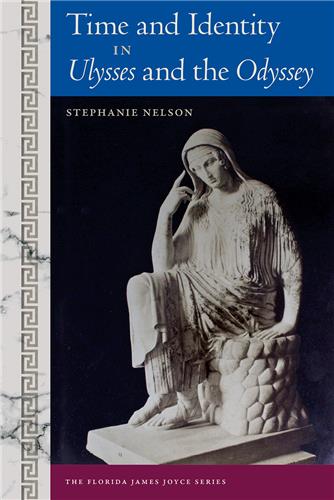Time and Identity in Ulysses and the Odyssey
Stephanie Nelson
Hardcover: $85.00
- Series: The Florida James Joyce Series
A comparative study of two classic literary works, from a specialist in Joyce and Homer
“An extraordinary piece of work: ambitious, illuminating, and erudite, exhibiting exceptional elasticity of thought and feeling.”—Vicki Mahaffey, author of Modernist Literature: Challenging Fictions
“Nelson engages the reader in re-experiencing the phenomena of these absorbing narratives and all the narrative issues she treats. Nelson’s great craft is in reprising them in such a way that her readers can recall the whole of works from her shrewd alignment of their distinctive parts.”—Michael A. Seidel, author of Epic Geography: James Joyce’s “Ulysses”
Time and Identity in Ulysses and the Odyssey offers a unique in-depth comparative study of two classic literary works, examining essential themes including change, the self, and humans’ dependence on and isolation from others. Stephanie Nelson shows that in these texts, both Joyce and Homer address identity by looking at the paradox of time—that people are constantly changing yet remain the same across the years.
In Nelson’s analysis, both Ulysses and the Odyssey explore dichotomies such as the permanence of names and shifting of stories, independence and connection, and linear and cyclical narrative. Nelson discusses Homer’s contrast of ordinary to mythic time alongside Joyce’s contrast of “clocktime” to experienced time. She analyzes the characters Odysseus and Leopold Bloom, alienated from their previous selves; Telemachus and Stephen Dedalus, trapped by the past; and Penelope and Molly Bloom, able to recast time through weaving, storytelling, and memory. These concepts are also explored through Joyce’s radically different narrative styles and Homer’s timeless world of the gods.
Nelson’s thorough knowledge of ancient Greece, Joyce, narratology, oral tradition, and translation results in a volume that speaks across literary specializations. This book makes the case that Ulysses and the Odyssey should be read together and that each work highlights and clarifies aspects of the other. As Joyce’s characters are portrayed as both flux and fixity, readers will see Homer’s hero fight his way out of myth and back into the constant changes of human existence.
Stephanie Nelson, professor of classical studies at Boston University, is the author of Aristophanes and His Tragic Muse: Comedy, Tragedy and the Polis in 5th Century Athens.
A volume in the Florida James Joyce Series, edited by Sebastian D. G. Knowles
- Sample Chapter(s):
- Table of Contents
- Excerpt
There are currently no reviews available












